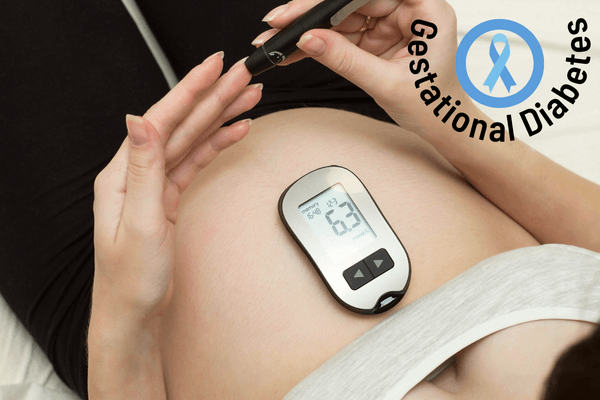Around 15% of women globally suffer from Gestational Diabetes during their pregnancy. So it is a fairly common medical issue. In this blog post, we will discuss the symptoms, diagnosis, treatment, and prevention of gestational diabetes.
What is Gestational Diabetes?
Gestational diabetes (gestational diabetes mellitus, or GDM) is a type of diabetes that develops during pregnancy and in women who do not have diabetes before they get pregnant.
Like normal diabetes, gestational diabetes happens when the body produces insufficient insulin and is not able to effectively deal with sugar control. This may make blood sugar levels rise in your body. Consequently, it may affect the wellbeing of both the mother and the baby. However, there is good news. Gestational diabetes can be successfully managed through proper care and treatment and following healthy eating habits and being physically active.
Gestational Diabetes symptoms and warning signs
The warning signs and symptoms of gestational diabetes are similar to those of other types of diabetes. They include:
- Frequent urination
- Fatigue
- Blurred vision
- Increased thirst
- Increased hunger
Gestational Diabetes Test and Diagnosis
Gestational diabetes test is usually conducted between 24 and 28 weeks of pregnancy. Your healthcare provider will perform a glucose challenge test, which involves drinking a sugary drink and then having your blood sugar levels checked after an hour. If your blood sugar levels are high, you will need to take the Oral Glucose Tolerance Test (OGTT) , which involves fasting for several hours and then drinking a sugary drink. Your blood sugar levels will be checked before and after the drink to determine if you have gestational diabetes.
It is important to get screened for gestational diabetes, even if you don’t have any symptoms. Early detection and treatment can help prevent complications for both the mother and the baby.Gestational Diabetes Treatment
The treatment of gestational diabetes typically involves making lifestyle changes to manage blood sugar levels. This includes:
- Following a healthy diet that is rich in fruits, vegetables, and whole grains
- Staying active with regular exercise
- Monitoring blood sugar levels regularly
- Taking insulin or other medications if necessary
Gestational Diabetes Complications and Risks
Gestational diabetes can increase the risk of and cause a number of complications for both the mother and the baby. These include:
- Preterm delivery
- Preeclampsia
- High blood pressure
- Increased risk of developing Type 2 Diabetes later in life
It is important to manage gestational diabetes carefully to prevent these complications. Your healthcare provider will work with you to develop a care plan that helps prevent complications and ensures a healthy pregnancy.
Although gestational diabetes often ends when the pregnancy ends, and your hormones return to normal, women who have had gestational diabetes are at higher risk of developing Type-2 diabetes later in life. Therefore if you have been diagnosed with gestational diabetes, get regular checkups done even after pregnancy to check your insulin levels and follow a healthy lifestyle to prevent or manage it properly. As you look into support during the postnatal period, include a consultation with a registered nutritionist to craft a healthy diet that you can follow throughout your postnatal recovery, breastfeeding and after.
Managing Gestational Diabetes
The main concern that women with gestational diabetes have is about managing it safely. Managing gestational diabetes involves following a healthy diet, staying active, monitoring blood sugar levels, and taking any necessary medications. It is also important to work with your healthcare provider to develop a personalized care plan that meets your specific needs. Here are a few pointers you can follow to manage your blood sugar levels.
- Eat Nutritious Food: Eating a healthy diet is a key part of managing gestational diabetes. The food choices you make will regulate your blood sugar level. So make informed food choices and avoid foods that can increase your blood sugar levels.
- Be Physically Active: Doing an adequate amount of physical activity on a regular basis is important for managing gestational diabetes. Regular moderate physical activity makes your body more sensitive to insulin and lowers blood sugar levels. It also helps you stay fit. Your healthcare provider may recommend activities such as walking, swimming, or prenatal yoga.
- Keep a Check on Blood Sugar: Monitoring your blood sugar levels on a regular basis will help ensure that they are in the right range. Anytime the levels shoot up, you must inform your doctor immediately. Moreover, your doctor will guide you on how to use a glucose meter and also when to check your blood sugar at home.
- Take the Prescribed Medication: In some cases, medication may be necessary to manage gestational diabetes. Your healthcare provider may prescribe insulin or other medications to help regulate your blood sugar levels.If you have been prescribed insulin to manage your blood sugar, take it per the prescription.
- Maintain Records of your Diet and Physical Activity: It might be helpful to maintain your diet and physical exercise records. This will help you stay aware of your diet, eating habits and activity levels as well as answer any questions on this topic during appointments with your care providers.
- Consult a Nutritionist: If you are working on managing gestational diabetes, consider including a nutritionist to your pregnancy support team. A registered nutritionist can help you develop a meal plan that is personalised to your condition and your nutritional needs, and fits your lifestyle.
- Get Adequate Sleep: Sleep is of utmost importance. Good sleeping habits maintain hormonal balance and overall health. Try to sleep & wake up around the same time every day and try to get at least 7 hours of uninterrupted sleep regularly.
- Focus on your mental wellbeing: Stress is another factor that would affect any pregnancy negatively. It can also create havoc on your hormones. So manage your anxiety and stress proactively. Try meditation or mindfulness breathing. Walking outside in nature or other small acts of self care could also go a long way in managing any anxiety. Reach out for counselling or therapy if need be.
Recommended foods and diet for Gestational diabetes
If you have gestational diabetes, it’s important to focus on a healthy and balanced diet that can help you manage your blood sugar levels and provide the nutrients you and your baby need. Here are some foods that are generally recommended for women with gestational diabetes:
- High-fiber foods: This includes fruits, vegetables, whole grains, legumes, and nuts. These foods can help slow down the absorption of carbohydrates and keep blood sugar levels more stable.
- Lean protein: This includes poultry, fish, eggs, and plant-based sources of protein like tofu, beans, and lentils. Protein can help regulate blood sugar levels and provide important nutrients for your baby’s growth and development.
- Healthy fats: This includes sources like avocado, nuts, seeds, and fatty fish like salmon. Healthy fats can help improve insulin sensitivity and provide important nutrients for you and your baby.
- Low-fat dairy products: These can provide important nutrients like calcium and vitamin D, but it’s important to choose low-fat options to limit saturated fat intake.
- Water: Staying hydrated is important for overall health and can also help manage blood sugar levels.
What foods to avoid if you have Gestational Diabetes?
Avoid or limit foods that can cause your blood sugar levels to spike.
- Sugary foods and beverages: This includes candy, cakes, cookies, sweetened drinks, and even fruit juice. These foods can cause a rapid increase in blood sugar levels.
- Refined carbohydrates: White bread, pasta, and rice can cause blood sugar spikes, so it’s better to choose whole-grain options instead.
- High-fat foods: While healthy fats are an important part of a balanced diet, foods that are high in saturated and trans fats should be limited. This includes fried foods, high-fat dairy products, and fatty meats.
- Processed and packaged foods: These often contain added sugars and refined carbohydrates, as well as unhealthy fats.
- Some fruits: While fruit is generally a healthy choice, some fruits are higher in natural sugars and can cause blood sugar spikes such as dates, mangoes, lychee, grapes etc. It’s better to choose fruits that are lower in sugar, such as berries, apples, and citrus fruits. Avoid dried fruits or candied fruits with high sugar content and go for dried coconut instead.
How to prevent Gestational diabetes?
While there is no guaranteed way to prevent gestational diabetes, there are steps you can take to reduce your risk. Doctors’ primary advice for prevention of gestational diabetes will be around nutrition. Here is a list of the main points that experts advice for preventing gestational diabetes:
- Eating a healthy diet that is rich in fruits, vegetables, and whole grains
- Staying active with regular exercise
- Maintaining a healthy weight before and during pregnancy
- Getting screened for gestational diabetes early in your pregnancy
- Managing any underlying health conditions, such as high blood pressure or polycystic ovary syndrome (PCOS)
Gestational diabetes causes
Who has higher Gestational Diabetes risk?
While any pregnant woman can develop gestational diabetes, there are some factors that can increase a woman’s risk of developing this condition. Some of these risk factors include:
- Age: Women who are 25 or older are at a higher risk of developing gestational diabetes.
- Family history: If there is a family history of diabetes, especially in first-degree relatives such as parents or siblings, a woman is at higher risk of developing gestational diabetes.
- Overweight or obesity: Women who are overweight or obese before pregnancy are more likely to develop gestational diabetes.
- Polycystic ovary syndrome (PCOS): Women with PCOS are at higher risk of developing gestational diabetes.
- Previous gestational diabetes: Women who have had gestational diabetes in a previous pregnancy are more likely to develop it in subsequent pregnancies.
- Previous delivery of a baby weighing over 9 pounds: Women who have delivered a baby weighing over 9 pounds are at a higher risk of developing gestational diabetes.
- Race and ethnicity: Women of certain racial and ethnic groups, such as Asian, African, Hispanic, or Native American are at higher risk of developing gestational diabetes.
Does Gestational diabetes lead to a high risk pregnancy?
Gestational diabetes can increase the risk of complications during pregnancy, but it does not necessarily mean that the pregnancy is classified as “high-risk pregnancy”. With appropriate management and care, most women with gestational diabetes can have healthy pregnancies and deliver healthy babies. However, gestational diabetes can increase the risk of certain complications, such as high blood pressure, preeclampsia, preterm birth, and delivery by cesarean section. It can also increase the baby’s risk of being born larger than average, which can lead to complications during delivery. So in certain situations gestational diabetes may raise the need of high-risk pregnancy care and monitoring.
Conclusion
Gestational diabetes is a common health condition that can affect many pregnant women. It is important to get screened for gestational diabetes and manage it carefully to prevent complications for both the mother and the baby. By following a healthy diet, staying active, monitoring blood sugar levels, and working with your healthcare provider, you can successfully manage gestational diabetes and have a healthy pregnancy.
If you have been diagnosed with gestational diabetes, you might have a long list of questions and anxiety regarding the condition. At Veira we have certified coaches that can help and guide you with your questions and your concerns. When you register you will be paired with a maternity coach who is picked to provide you with pregnancy and postnatal support. You can then book 1-on-1 video consults with your Veira coach and receive personalised help and advice.
With Veira, you will not walk alone.





